Question
The COVID-19 pandemic dealt a massive blow to the Australian economy in the first half of 2020. The tourism and education sectors, two of the
The COVID-19 pandemic dealt a massive blow to the Australian economy in the first half of 2020.
The tourism and education sectors, two of the top exporting industries in Australia, were brought down to their knees as the federal government moved to close international borders in March 2020. At the same time, a large number of businesses were forced to shut down as restriction measures were imposed across the country.
Dr. Philip Lowe, the governor of the Reserve Bank of Australia (RBA), described the pandemic as a 'once-in-a-century event', which caused 'the biggest contraction in national output and income ever witnessed since the 1930s'.
Question1.Clearly explain how aggregate demand (AD), short-run aggregate supply (SRAS) and long-run aggregate supply (LRAS) would be affected by the COVID-19 pandemic.(1 + 1 + 1 = 3 marks)
Question2.Draw appropriate diagram(s) to illustrate the effects on the Australian economy caused by the COVID-19 pandemic. Make sure to clearly and adequately label your diagram(s). Assume that before the pandemic, the Australia economy was at the long-run equilibrium.(3 marks)
Question3.Clearly explain how key macroeconomic variables (general price level, real GDP, and unemployment rate) would change as a result of the COVID-19 pandemic.(1 + 1 + 1 = 3 marks)
Question4.In the wake of the economic fallout caused by COVID-19, should the Reserve Bank of Australia (RBA) implement contractionary monetary policy OR expansionary monetary policy? Clearly explain why.Note: You only have to point out whether contractionary or expansionary monetary policy is needed and explain why. You do not have to provide details on how the policy will be implemented. That would be for another part in this question.(1 + 1 = 2 marks)
Question 5.Clearly explain in detail the steps that the RBA has to go through in order to implement the type of monetary policy as suggested in Question 4.(2 marks)
Question 6.Given the unprecedented severity of the COVID-19 economic crisis, conventional monetary policies alone did not suffice. The RBA pushed for several unconventional, extraordinary measures in order to further stimulate the economy. Based on your own research, point out TWO unconventional policies conducted by the RBA in response to the COVID-19 economic fallout.(1 + 1 = 2 marks)
Question 7.Assume that efforts by the RBA proved successful. Draw appropriate diagram(s) to illustrate the effects of the RBA's monetary policies on the Australian economy. Explain clearly how key macroeconomic variables (general price level, real GDP, and unemployment rate) would respond to actions taken by the RBA.(1.5 + 1.5 = 3 marks)
Question 8.Is monetary policy more effective in taming an overheated boom (expansion) OR fighting a deepening slump (recession)? Clearly explain why.(1 + 1 = 2 marks)
Step by Step Solution
There are 3 Steps involved in it
Step: 1

Get Instant Access to Expert-Tailored Solutions
See step-by-step solutions with expert insights and AI powered tools for academic success
Step: 2

Step: 3

Ace Your Homework with AI
Get the answers you need in no time with our AI-driven, step-by-step assistance
Get Started


